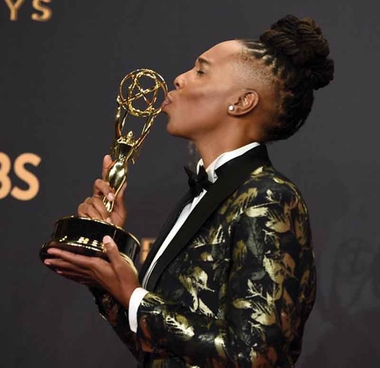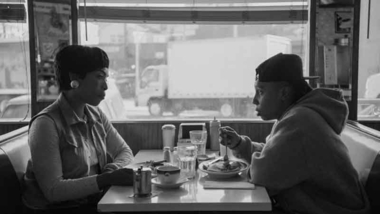Lena Waithe: The black lesbian creative genius behind "Master of None"

by Mahkesha Hogg
LGBT+ Black Issues Columnist
My introduction to Lena Waithe was seeing her Emmy acceptance speech. She is the first black lesbian woman to win an Emmy for comedy writing for the Netflix series Master of None.
After seeing her character’s coming out scene, I knew I had to tell you about this pioneer. I am always looking for new series that give real aspects of what it means to grow up black and queer in the United States.
Master of None is about Lena’s character, Denise, growing up with her diverse group of friends and figuring out how to be accepted and thrive as a black woman who happens to be gay.

Denise’s mother is a typical strong, single black woman doing the best she can to raise Denise. She has the help of her sister and mother. The show takes us from Denise’s childhood to adulthood specifically focusing on Thanksgivings throughout the decades.
Coming out during the holidays may not be a bad idea because there is a sense of warmth in the air. People aren’t as likely to be hostile…wait, ugh, scrap that. We are talking about black families and we all know we tell it like it is (no matter how harsh) especially our elders.
I have been to a few holiday dinners where there was screaming and walking out. So, I can only imagine what it would be like for a black person or POC to come out. Sometimes the only way to do it is to just be…unapologetically LGBT+. Bring your partner or discuss a new love. This will be your family’s new normal. You set the standard.
In the 1995 scene when Denise was a young teen, she came out to her friend from India, played by Aziz Ansari. She was explaining that it is very intense to come out to your family when you are black. She stated, “When black people come out as gay, the parents act as if they did something wrong and they try to fix it like it’s a choice. The children are like trophies and when you are gay you are tarnishing that trophy.”
The episode moves on to Denise’s adulthood in which she decides to come out to her mom at a restaurant. Her mom starts crying and says that she doesn't’t want life to be hard for her. “It’s hard enough for you being a black woman then you wanna add this?” her mom says.
Denise replies, “I’m still me. I’m still your daughter. It’s not like I chose this.”
Thanksgiving Day comes and she brings over a girlfriend for the first time. Everyone acts awkward towards the girlfriend except the grandma – surprisingly. Denise’s aunt and mother never made eye contact with her girlfriend nor did they ask her questions about her life.
When the dinner was over, Denise’s mom accused her of being overly sexual at the dinner table and that she will respect her house. Denise did not so much as hold her hand but her mom let her homophobia distort her view.
The next year, at Thanksgiving, she brings the same girlfriend but this time she is warmly embraced by everyone except the mom. They finally bond in the kitchen when Denise’s girlfriend asks if she can help with the food. The mom agrees and they start cracking jokes about how they both wish that Denise would dress differently.
See, all it takes is time and eventually they will accept it or you will accept not being the toxicity of their bigotry. Just know that it does get better.
Copyright The Gayly – November 13, 2017 @ 7:10 a.m. CST.





